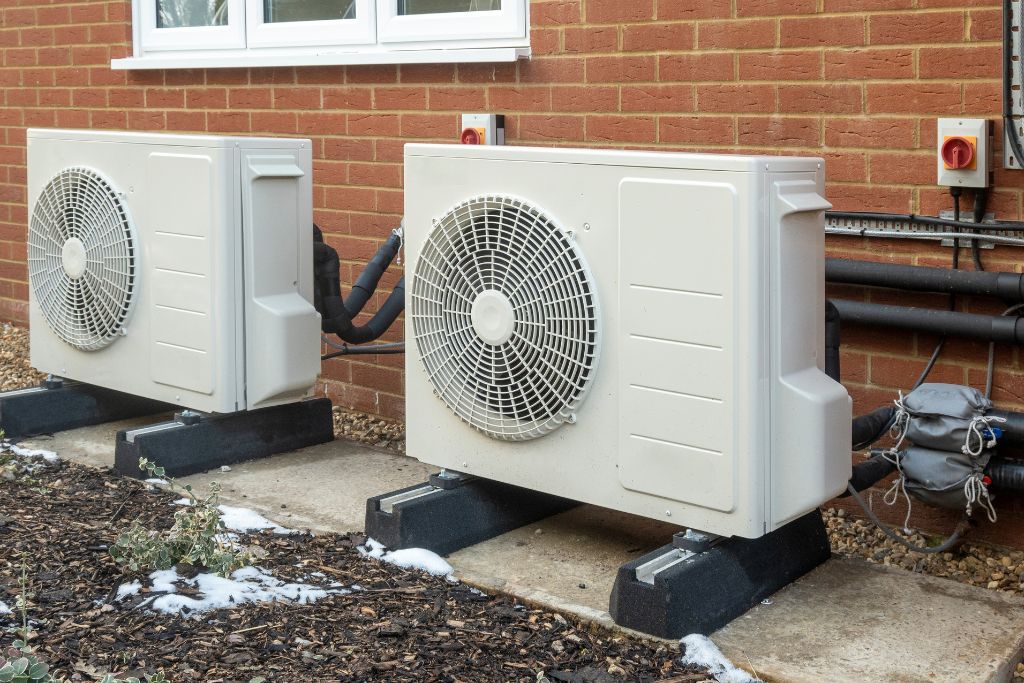In September 2023, French President Emmanuel Macron took a firm stance on climate action during an ecological planning council. His vision? A significant reduction of greenhouse gas emissions by 55% by 2030, measured against the 1990 benchmark. Amidst the diverse array of initiatives presented, one announcement raised eyebrows – Macron’s unwavering commitment to producing one million heat pumps by the end of his presidential term. This move, which took centre stage among his less concrete propositions, merits a closer look beyond the political lens. In this piece, we explore the nuances of heat pump technology, unveiling why it merits special attention as a potent climate change mitigation tool.
—
The Mechanics of Heat Pumps
The process begins with an outdoor component known as the evaporator. In heating mode, a fan or a similar device blows air across the evaporator coil. As air passes over the coil, it transfers its heat energy to the refrigerant inside the coil. The refrigerant, which is initially in a low-pressure, low-temperature liquid state, absorbs this heat and evaporates, turning into low-pressure gas.
Next, we have the compressor, the heart of the system. This mechanical component raises the pressure and temperature of the gas to high levels. This step consumes energy but is essential to prepare the heat pump for effective heating. As the gas is compressed, its temperature rises significantly.
The final stage takes place in the condenser. Here, a fan blows indoor air over the coil, allowing the hot refrigerant gas to release its stored heat into the room. As the process concludes, the refrigerant returns to its liquid state, ready to repeat the cycle in the evaporator.
Exceptional Efficiency of Heat Pumps
Heat pumps deserve recognition for their exceptional efficiency, measured by the Coefficient of Performance (COP). This metric quantifies a heat pump’s effectiveness in heating or cooling spaces. A COP of at least 2.5 means that for every unit of energy consumed, the heat pump provides 2.5 units of heating or cooling. This level of performance surpasses most other heating systems.
This efficiency translates into cost savings by requiring less energy to achieve the same heating or cooling outcomes. Furthermore, their versatility eliminates the need for separate heating and cooling systems, which streamlines costs and space usage. Research indicates that an air-to-water heat pump can save a typical European household around €1,300 (US$1,378) annually compared to a traditional gas-based heating system, while a solar-air heat pump can yield savings of up to €2,400 (US$2,546).
Most importantly, heat pumps represent a crucial leap towards a more environmentally friendly and sustainable future. By relying on heat transfer principles, they generate fewer greenhouse gas emissions compared to their energy-intensive counterparts. In today’s world, heating alone accounts for more than 50% of global energy consumption, contributing significantly to the alarming levels of carbon emissions.
The transition from traditional heating methods to heat pumps holds the promise of substantial reductions in greenhouse gas emissions. By embracing this technology, we have the potential to cut emissions by half in just a decade.
You might also like: ‘Staggering’ Clean Energy Growth Is Keeping Path to Limit Global Warming to 1.5C Open, IEA Chief Says
Challenges of Heat Pumps
While heat pumps excel in moderate climates, they face challenges in severe cold conditions. Their efficiency diminishes as outdoor temperatures drop because there is less heat energy available outdoors to capture. This reduction in efficiency results in a lower COP, and heat pumps may struggle to meet heating requirements. Research has indicated that standard heat pumps tend to experience a notable reduction in heating capacity, particularly as temperatures dip below 0C (32F), leading to increased power consumption.
To address this issue, manufacturers have developed cold-climate heat pumps specifically designed to operate in freezing temperatures. These advanced systems incorporate features like variable-speed compressors, improved defrost cycles, and enhanced insulation to maintain their effectiveness in extreme cold.
However, even with these advancements, there is a practical limit to how well a heat pump can perform in extremely cold conditions without supplementary heating. Therefore, homeowners often opt for dual-fuel systems, combining a heat pump with a backup heating source to ensure comfort during harsh winters without sacrificing overall energy efficiency.
In addition to the factors mentioned earlier, it is essential to recognise that deploying heat pumps is not a straightforward task.
The feasibility of installing heat pumps is heavily influenced by the condition of the building itself. For instance, it is considerably more challenging to install heat pumps in older buildings with inadequate insulation in the walls and windows. In such buildings, heat loss is a significant issue, particularly during colder months, and this can lead to a notable reduction in the efficiency of heat pumps.
You might also like: How to Lower Your Carbon Footprint Through An Eco-Friendly Home Audit
Conclusion
Macron’s commitment to promoting heat pumps is indeed a rational step, especially considering their environmentally friendly attributes and political significance. This initiative resonates well with the French population, particularly in light of the exorbitant energy costs experienced during the harsh winter of 2022, primarily driven by the ongoing conflict between Russia and Ukraine. Furthermore, Macron had previously advised households to set their heating systems to a temperature of 19C as a short-term measure during the energy crisis, further emphasising the need for energy-efficient solutions like heat pumps.
However, Macron’s strong emphasis on heat pumps brings into focus the lack of specificity in other aspects of his climate plan. For instance, his plan to phase out coal usage lacks a clear outline of alternative energy sources. This raises questions and critiques regarding the comprehensiveness of his overall strategy.
In essence, while the advancement of heat pump technology is vital, it should be viewed as one piece of a larger puzzle, and Macron’s climate plan should encompass a broader range of initiatives to create a more sustainable and climate-resilient future.
You might also like: Gas vs Electric Stoves: Which One Is Better for Your Health and the Environment?


















